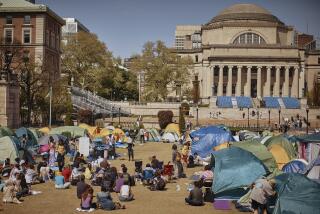UPDATE : Rutgers Remains Embroiled Over Power of a Few Words
- Share via
NEWARK, N.J. — It was one sentence out of thousands spoken in a 35-year career on college campuses, but the firestorm it provoked at Rutgers University shows little sign of abating.
Less than a day before the beginning of Black History Month, a local newspaper reported that university President Francis Lawrence had told an assembly of academics that African American students performed poorly on standardized tests because of their “genetic, hereditary background.”
The reaction immediately brought student demands that Lawrence resign, despite his profuse public apologies.
Campus life has yet to return to normal for the faculty, staff and students. African American leaders and organizations, including the National Assn. for the Advancement of Colored People, are still calling for Lawrence’s resignation. Numerous student rallies have been held to denounce Lawrence. Athletic events have been disrupted.
The university’s Board of Governors, while condemning his words, recently reaffirmed its support of Lawrence, even as several hundred students protested outside its meeting.
The incident, however, isn’t an open-and-shut case of racism in the academic world. Lawrence is a longtime civil rights advocate. As a result, a fault line has developed between those who perceive him as a man who accidentally stumbled into a controversial topic--and is now falling victim to the vengeful winds of political correctness--and those who believe that his comments were so heinous that they necessitate his resignation.
*
“No apology or explanation can undo the damage that has been done,” said Walter L. Fields Jr., political action director of the NAACP’s New Jersey chapter.
“It’s preposterous to think this guy is a racist,” counters Roger Kimball, author of “Tenured Radicals,” a 1991 critique of university policies. “(But) there are certain little epithets that stick with you, like ‘racist’ or ‘anti-Semite.’ Whether they are true or not doesn’t really matter. . . . I suspect his days in this job are numbered.”
Ironically, Lawrence made the statement while criticizing college admission tests--such as the Scholastic Assessment Test--for their bias against disadvantaged students, including African Americans.
“Do we set standards in the future so we don’t admit anybody? Or do we deal with a disadvantaged population that doesn’t have the genetic, hereditary background to have a higher average?” Lawrence asked.
Lawrence has since attributed his remark, which he calls a misstatement, to the influence of reading reviews of “The Bell Curve,” a book that contends African Americans are inherently less intelligent than whites and Asians.
“The Bell Curve” has been a bestseller for months, even as many reviewers have savaged its scientific methodology. Its supporters and critics agree that its popularity has increased sensitivity to remarks like Lawrence’s.
But Dinesh D’Souza, author of “Illiberal Education,” contends “The Bell Curve” has actually stifled discussion about ethnic groups and their academic performances.
*
Students at the Newark campus appear divided about Lawrence and his remark. “I think he accidentally said it, but I think it’s something he believes in his heart, whether he acknowledges it or not,” said Dakota Byfield, 30, a black psychology major.
“I don’t think he’s racist; I think he doesn’t understand what genetics are,” countered Abby Larrison, 24, a graduate student. Another student suggested that good grades would disprove Lawrence’s statement.
Lawrence has demonstrated a strong concern for minority issues. At Tulane University, where he was vice president, administrators credit him with raising the school’s minority enrollment from 1% to 10%.
Since Lawrence, who is white, assumed the presidency of the Rutgers system in 1990, he has inaugurated a $5-million fund-raising effort to increase minority scholarships.
“It’s ironic,” D’Souza said. “This man has been appeasing campus activists for a long time. The revolution is eating its own children.”
More to Read
Sign up for Essential California
The most important California stories and recommendations in your inbox every morning.
You may occasionally receive promotional content from the Los Angeles Times.













